I recently took a trip during which I had a number of inactive periods; anticipating this, I had brought along a bunch of movies to watch. Most of these were animated movies from Pixar. In a short period of time, I watched Ratatouille, Brave, Up, and Finding Nemo. Comparing and contrasting these movies gave me some interesting insights.
It is striking to compare the best of the set (Brave) with the worst (Finding Nemo). The differences between the two movies are loud and clear. They both concern conflicts between a parent and a child. The father in Finding Nemo, Marlin, was about as flat a character as I have seen in the movies. Scarred by the loss of wife and children, this guy is uniformly humorless and risk-averse. He spends the entire movie avoiding trouble. The central dramatic character transformation in the movie is his willingness to accept the necessity of risk — but that's a grudging adjustment, not a quantum leap.
Contrast this with Elinor, the mother in Brave. She undergoes a major change as part of her realization that her daughter's happiness is just as important as the traditions in which she was brought up.
The changes undergone by each of the children in the two movies are radically different. Merida in Brave undergoes a great deal of maturation; she starts as a selfish child and ends as a young woman. Nemo doesn't change much at all.
Another key difference lies in the richness of the facial expressions in the two movies. Merida, Elinor, and father Fergus all show a huge range of facial expression; father-fish, Nemo, and sidekick Dory are all pretty flat. Here’s a direct comparison of facial expressions from the two movies, along with captions representing the emotion being expression:


I hope that you will agree that the facial expressions in Brave are more nuanced, more subtle than those in Finding Nemo. After all, the animators in the latter film didn’t have much to work with. The human face is more expressive than a fish’s face, even an anthropomorphized fish’s face.
But the thing that really struck me about Brave was the nuance. Over and over again, tiny details struck me. In the opening sequence in Brave, where Merida is a little girl, she returns from the forest with the arrow she had lost, running up to her mother breathlessly. As she reaches them, her head bobs from side to side in a manner characteristic of small children whose coordination of neck musculature has not yet matured.
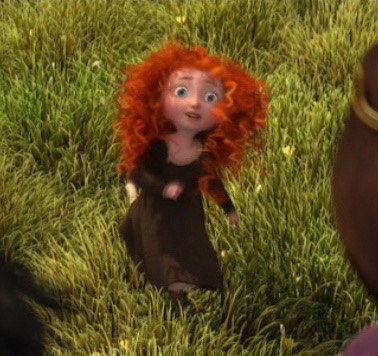
Before the presentation of the suitors, Elinor dresses Merida in her special gown, which is too tight and makes Merida uncomfortable. Merida complains bitterly and, for just a moment, Elinor empathizes with her daughter. This is a truly subtle facial expression:
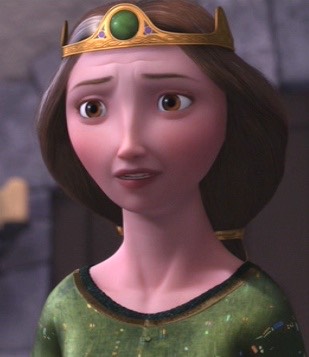
The most magnificent scene in the movie comes when Merida outshoots the three suitors. Her steady march bespeaks iron determination and intense concentration. And her final shot, presented in slow motion, is a picture of intensity. She exhales gently just before loosing the arrow.
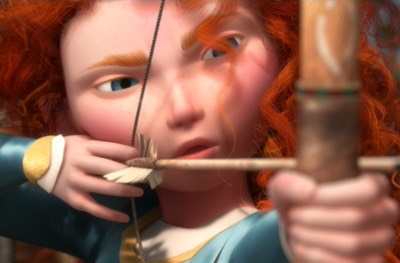
The arrow bends and quivers as is propelled from the bow. And the scene closes with her triumphant pleasure at a perfect shot, then she turns to face her mother defiantly – with a rushing sound that makes no physical sense but perfect emotional sense.
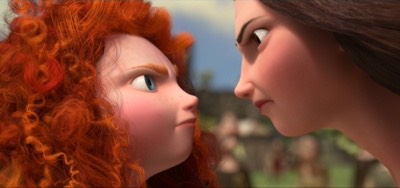
Lots of other tiny moments in the movie struck me. When the lords of the other clans march into the King’s throne room, Lord Dingwall walks in a stumpy fashion. In the archery competition, Lord Dingwall’s son is shown plucking the bowstring like a musical instrument. A moment later, Lord Macintosh’s son hurls his bow in frustration and a voice at the rear of the crowd shouts “Ah got it!”. When Dingwall’s son hits the center of the target, Dingwall dances a jig and moons his peers:
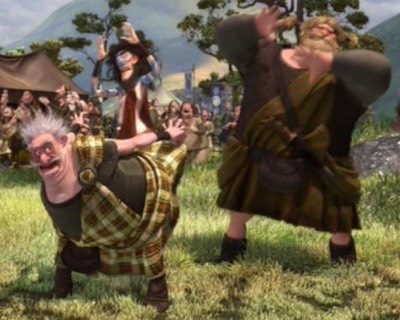
When Fergus has locked Merida inside the room to protect her, Merida is desperate to escape. She runs a chair into the door to no effect. She seizes a poker from the fireplace and tries to pry the door open. What's striking is the manner in which she grabs the poker. She doesn't merely pull it out of its holder; she whips it upward with one motion and catches it midair in a second motion. What a beautiful way to demonstrate her desperation and impatience in a fraction of a second!
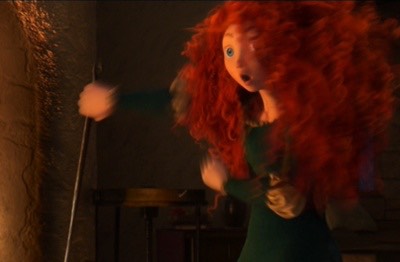
When Merida is desperately searching for a needle to repair the tapestry, she tears through the drawers searching frantically, then finds it and cries, “Ya beauty!”:
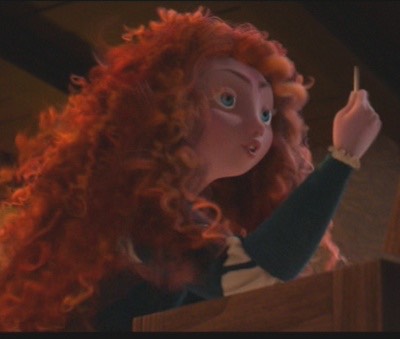
In the final moments of the movie, Fergus is about to kill the bear that is actually his wife Elinor, when Merida dashes up, attacks Fergus, chops off his peg leg, and defiantly declares, “I’ll not let you kill my mother!” This is truly a moment of great drama, and nothing, absolutely nothing in Finding Nemo even approaches it in dramatic power.
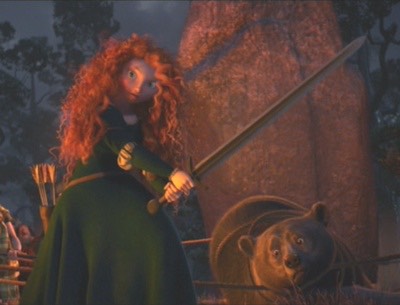
All these things impressed me mightily. By contrast, I can’t think of any similar moments in Finding Nemo. What’s especially surprising to me about this is that Finding Nemo was more successful than Brave: while Finding Nemo achieved a 99% ranking on Rotten Tomatoes, Brave only scored 78%. While Finding Nemo grossed $936 million, Brave grossed only $539 million. Why such a big difference between my own evaluation and that of others? I suspect that others are rating the two movies as children’s movies, whereas I am rating them as mature dramas.
